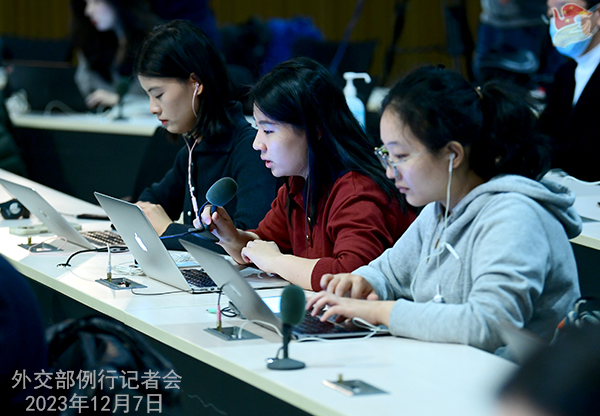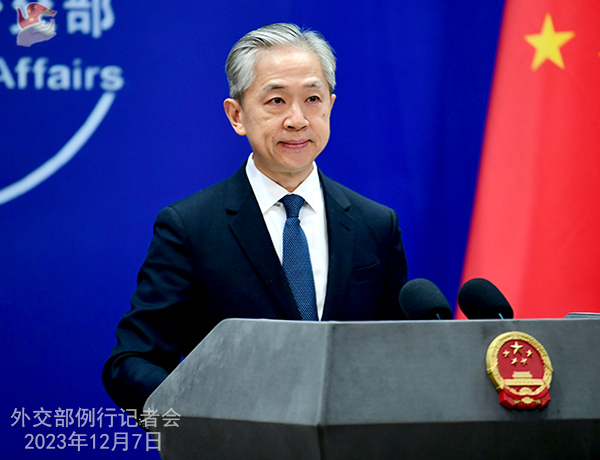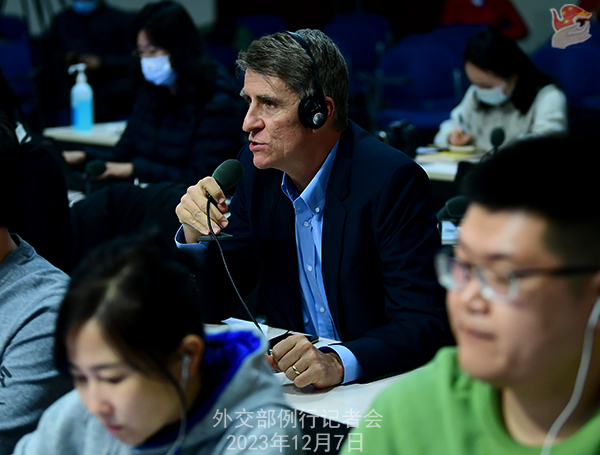At the invitation of the Argentine government, President Xi Jinping’s Special Envoy and Vice Chairman of the Standing Committee of the National People’s Congress Wu Weihua will go to Buenos Aires to attend the inauguration ceremony of Argentina’s new President Milley on December 10.
ANSA: Italy has officially notified China of its withdrawal from the Belt and Road Initiative, and Italy joined the initiative in 2019. What is China’s comment? What does this decision mean from a Chinese perspective? What does this mean for China-Italy relations?
Wang Wenbin: In the 10 years since the Belt and Road Initiative was proposed, its results have benefited more than 150 countries, making it the most popular international public product and the largest international cooperation platform in the world today. In October this year, the third “Belt and Road” International Cooperation Summit Forum was successfully held in Beijing. Representatives from 151 countries and 41 international organizations, including Italy, participated in the forum and produced 458 results, releasing the spirit of unity, collaboration, openness and win-win. The clear signal reflects the huge appeal and global influence of jointly building the “Belt and Road”. China firmly opposes smearing and undermining cooperation in jointly building the Belt and Road Initiative, and opposes confrontation and division among the camps.
Xinhua News Agency: At the recent 28th Conference of the Parties (COP28) to the United Nations Framework Convention on Climate Change, more than 100 countries agreed to triple the global installed capacity of renewable energy power generation by 2030. Some foreign media commented that China is the only major country at COP28 that is truly expected to achieve this goal. What’s the spokesperson’s comment on this?
Wang Wenbin: China attaches great importance to the development of renewable energy. In a short period of time, it has transformed from a follower to a leader in renewable energy. Its installed capacity, power generation level, and industrial competitiveness have continued to reach new heights.
We have solidly promoted the “deepening” of the energy revolution and written a “green answer” to the global response to climate change. China’s investment in renewable energy has ranked first in the world for seven consecutive years, and its installed capacity of renewable energy power generation has exceeded 1.4 billion kilowatts, surpassing coal power. More than half of the world’s new energy vehicles are driven in China. Green and low-carbon has been integrated into the daily life of Chinese people. At the recently successfully held Hangzhou Asian Games, all competition venues used “green electricity” for conventional electricity, and more than 100 million people contributed “green energy” through low-carbon actions, setting a record for achieving carbon neutrality for the first time in the history of the Asian Games.
We actively promote the “going out” of green energy and help more developing countries draw a “green picture.” From the Karot Hydropower Station in Pakistan, to the De’A Wind Power Project in South Africa, to the Al Dhafra Photovoltaic Power Station in the United Arab Emirates, renewable energy projects undertaken by Chinese companies are spread all over the world, lighting up the green and low-carbon development dreams of more and more countries. . Currently, 50% of the world’s wind power and 80% of photovoltaic equipment come from China. As of September this year, China has signed 48 memorandums of understanding on South-South cooperation on climate change with dozens of developing countries, cooperated in the construction of 4 low-carbon demonstration zones, and launched 75 climate change mitigation and adaptation projects, making green and low-carbon The results of cooperation benefit more countries.
China will continue to firmly promote green and sustainable development and do its best to contribute to the global response to climate change. We also hope that all COP28 member states can effectively implement the consensus, make corresponding contributions to achieve relevant goals in accordance with their respective national conditions, jointly solve the challenges and bottlenecks facing the development of renewable energy, and contribute to the full and effective implementation of the Paris Agreement and jointly build a clean and beautiful world. And make unremitting efforts.
“Beijing Daily” reporter: Recently, the Japan Defense Research Institute released the “China Security Strategy Report 2024”. The report stated that as China strengthens its armaments, including nuclear forces, and deepens strategic coordination with Russia, the confrontation between China, Russia and the United States will intensify in the future. The report believes that in order to prevent China from using its strength to change the status quo in the Taiwan Strait region, Japan must strengthen its defense capabilities. What is China’s comment?
Wang Wenbin: China adheres to the path of peaceful development and pursues a defensive national defense policy. China’s development is the growth of the world’s peaceful forces. Taiwan is part of China, and the Taiwan issue is China’s internal affairs. How to solve the Taiwan issue is a matter for the Chinese people themselves and does not tolerate any external interference. The relevant Japanese think tank report made unreasonable comments on China’s internal affairs, military modernization and China’s relations with other countries. The relevant remarks are irresponsible and untenable.
Due to historical reasons, Japan’s military and security trends have always attracted much attention from its Asian neighbors and the international community. In recent years, Japan has significantly increased its military spending and sought to develop offensive weapons, which has triggered strong concerns among neighboring countries and the international community. We urge Japan to earnestly respect the security concerns of its neighboring countries, deeply reflect on its history of aggression, stop relying on exaggerating the “China threat” to find excuses for its military expansion, and take concrete actions to win the trust of its Asian neighbors and the international community.

“New York Times” reporter: Did the China-EU leaders’ meeting make substantial progress in bilateral relations?
Wang Wenbin: This morning, President Xi Jinping met with European Council President Michel and European Commission President von der Leyen, who were in China for the 24th China-EU Leaders’ Meeting. I would like to take this opportunity to introduce to you the relevant circumstances of the meeting.
President Xi Jinping pointed out that since the end of last year, China-EU relations have shown a good momentum of consolidation and development, and high-level dialogues in the strategic, economic and trade, green, and digital fields have achieved fruitful results, which is in line with the interests of both sides and the expectations of the people. China and Europe are the two major forces promoting multipolarity, the two major markets supporting globalization, and the two major civilizations advocating diversity. In the current international situation of increasing turmoil, China-EU relations have strategic significance and global influence, and are related to world peace, stability and prosperity. Both sides have the responsibility to jointly provide more stability to the world and provide more impetus for development.
President Xi Jinping emphasized that this year marks the 20th anniversary of the establishment of a comprehensive strategic partnership between China and the European Union. Both sides should sum up historical experience, grasp the general trend of the world, and adhere to the correct positioning of the comprehensive strategic partnership. Both sides should consolidate their political foundation, insist on viewing each other from a strategic perspective, give full play to the leading role of leaders’ meetings and five high-level dialogues, strengthen strategic communication, enhance understanding and properly handle differences through constructive dialogue. Both sides should establish a correct understanding, enhance understanding and mutual trust, value trust and justice, and develop relations wholeheartedly. They should not regard each other as opponents because of different systems, should not reduce cooperation because of competition, and should not engage in confrontation because of differences. The economies of China and Europe are highly complementary, and both sides should do more to tighten the bonds of China-EU community of interests through deeper and broader cooperation. China’s economic growth maintains a steady and positive momentum. China is promoting high-quality development and high-level opening up, and is willing to regard the EU as a key partner in economic and trade cooperation, a priority partner in scientific and technological cooperation, and a trusted partner in industrial and supply chain cooperation to pursue mutual benefit and win-win results and achieve common development. Both sides should strengthen the complementarity of market, capital and technological advantages, promote the upgrading of traditional industries and the development of emerging industries, explore new models of cooperation, create new growth points, and work together to improve the industrial and supply chains. Both sides should also strengthen people-to-people and cultural exchanges and facilitate personnel exchanges.
President Xi Jinping emphasized that Chinese-style modernization and European integration are strategic choices made by China and the EU each with an eye on the future. China and the EU should respect and support each other, strengthen the docking of development strategies, and achieve common development. The Belt and Road Initiative is an open platform that has brought tangible benefits to more than 150 countries and people in the world. China is willing to continue to promote high-quality joint construction of the “Belt and Road”, including docking with the EU’s “Global Gateway” plan, and work together to help developing countries accelerate their development. The two sides should strengthen communication and coordination within multilateral frameworks such as the United Nations and the G20, adhere to multilateralism, oppose confrontation between camps, promote political solutions to international and regional hot issues, and conduct dialogue and cooperation on major issues related to the future of mankind such as artificial intelligence. , and contribute to improving the well-being of all mankind and responding to global challenges.
President Michel and President von der Leyen said that the EU and China are two major forces in the world and important economic and trade partners for each other, with increasingly broad areas of cooperation. EU-China cooperation is mutually beneficial and equal. Managing and developing EU-China relations well is directly related to the interests of the people on both sides, and is also related to the prosperity and security of the world. The EU attaches great importance to its relations with China and does not want to decouple from China. It looks forward to developing a long-term, stable, predictable and sustainable relationship with China. It hopes that this EU-China leaders’ meeting will inject new impetus into the future development of EU-China relations. . The European side is pleased with the results of the high-level dialogue between Europe and China in various fields this year. It believes that the long-term and stable development of China’s economy is in the interests of Europe. It hopes that both sides will continue to strengthen dialogue and cooperation in the fields of economy, trade, green, digital and other fields, and work together to maintain the stability and security of the supply chain and industrial chain. And strengthen dialogue and seek cooperation on climate change, artificial intelligence and other major global issues related to the future of mankind. The EU adheres to the one-China policy. The EU is willing to strengthen communication and enhance understanding with China on issues of disagreement in an attitude of mutual respect, openness and candor. Europe and China share common responsibilities and common interests for world peace and stability. The EU is willing to communicate and collaborate closely with China to safeguard multilateralism, uphold the purposes and principles of the United Nations Charter, and promote the resolution of hot-spot issues in Ukraine, the Middle East and other regions.
It is not difficult to see from the above introduction that this contact between Chinese and European leaders is very beneficial. Both sides have sent a positive signal of working together to promote the further development of China-EU relations. Next, Premier Li Qiang will hold the 24th China-EU Leaders’ Meeting with the two EU leaders. We will release information in a timely manner, so please stay tuned.
AFP: A US State Department official said yesterday that the United States is paying close attention to reports that Chinese warships docked at Cambodian ports. Can China confirm relevant reports? What are the warships arriving at Cambodian ports? Is this the first time a Chinese warship has docked in Cambodia? Do they have any plans to participate in military exercises?
Wang Wenbin: China and Cambodia have a very profound friendship, and the two sides have carried out fruitful cooperation in various fields. Regarding the visit of Chinese warships to Cambodia you mentioned, please refer to the competent authorities.

CCTV reporter: China has just announced that General Secretary and President Xi Jinping will pay a state visit to Vietnam. How does China view the current China-Vietnam relations? Can you introduce the arrangements for this visit and China’s expectations?
Wang Wenbin: China and Vietnam are socialist neighbors. After the 20th National Congress of the Communist Party of China at the end of last year, General Secretary and President Xi Jinping invited General Secretary of the Communist Party of Vietnam Central Committee Nguyen Phu Trong to visit and jointly draw a blueprint for the development of China-Vietnam comprehensive strategic cooperative partnership. Since the beginning of this year, the two sides have had frequent high-level interactions, close exchanges between various departments and localities, and continued deepening of cooperation in various fields, which has brought tangible benefits to the two peoples.
Currently, the world is in a new period of turbulence and change, with increasing instability and uncertainty. China and Vietnam are both socialist countries and are promoting reforms and innovations that are in line with their respective national conditions. Strengthening unity and friendship and deepening mutually beneficial cooperation are in the common interests of both sides and are conducive to maintaining peace, stability and prosperity in the region and even the world.
During this visit, General Secretary and President Xi Jinping will hold talks with General Secretary of the Central Committee of the Communist Party of Vietnam Nguyen Phu Trong and President Vo Van Thang respectively, and meet with Vietnamese Prime Minister Pham Minh Zheng and Chairman of the National Assembly Ong Dinh Hue. The two sides will discuss the new positioning of China-Vietnam relations, focusing on politics, security The six major areas of cooperation, pragmatic cooperation, public opinion foundation, multilateral and maritime issues will promote the comprehensive strategic cooperation between the two countries to be deeper and more practical. This will help the two countries join hands in pursuing a modernization path with their own characteristics and jointly enrich the path of developing countries towards modernization. , better benefiting the people of the two countries.
“New York Times” reporter: Since this year, Europe has expressed more and more concerns about security issues related to China. Does China believe that on security and Ukraine issues, the European side is following the views of the United States instead of making judgments based on its own interests?
Wang Wenbin: China has always viewed China-EU relations from a strategic and long-term perspective. We regard Europe as a comprehensive strategic partner and an important pole in a multi-polar world. We support the EU in adhering to strategic independence, working with China to practice true multilateralism, and joining hands to safeguard world peace, promote common development, and respond to global challenges. effort.
Bloomberg: According to a Singaporean official visiting China, Singapore will establish a 30-day mutual visa exemption arrangement with China. Can the spokesperson provide more information? Can this be confirmed?
Wang Wenbin: It is in the fundamental interests of the two peoples for China and New Zealand to further strengthen people-to-people and cultural exchanges. Both sides agreed to exempt each other from visas for ordinary passport holders. Currently, the competent authorities of the two countries are in close communication on specific matters. The realization of comprehensive mutual visa exemption between China and New Zealand is a great thing for the people of the two countries. Both sides look forward to the early entry into force of the relevant arrangements.
AFP reporter: Australia and Papua New Guinea have signed a security agreement. China-Pakistan relations have been deepening in recent years. What is China’s comment on the relevant security agreement?
Wang Wenbin: We are happy to see countries inside and outside the region carry out normal exchanges and equal cooperation with Pacific island countries. China also maintains good cooperative relations with Pacific island countries on the basis of equal treatment, mutual respect, win-win cooperation, openness and inclusiveness. Relevant cooperation goes hand in hand with other bilateral and multilateral cooperation and complements each other. China is willing to work with all countries that truly care about island countries to leverage their respective advantages and form international synergy to jointly support island countries in enhancing their independent and sustainable development capabilities.

Source : mfa.gov.cn


